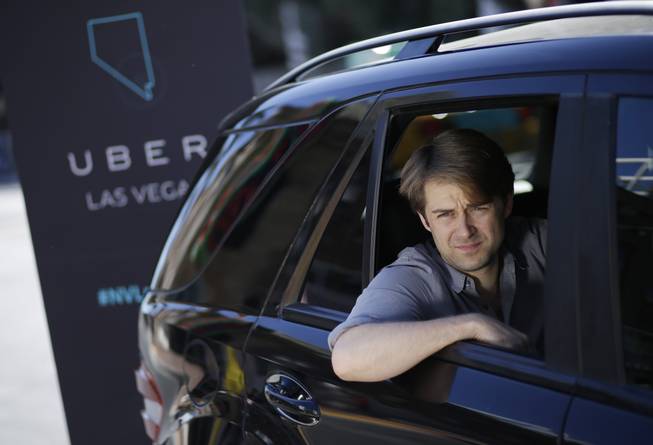
John Locher / AP
Uber West Coast Regional Manager William Barnes sits in the back of a car during a photo shoot Friday, Oct. 24, 2014, in Las Vegas.
Friday, Nov. 14, 2014 | 2 a.m.
Related stories
- Uber back in court to defend its Las Vegas ride service
- Why Uber has cracked the taxi market in 70 cities — but not Las Vegas
- Judge puts the kibosh on ridesharing Uber in Nevada, for now
- Multiple drivers cited within hours of Uber launch
- Judge refuses to put brakes on Uber ride-sharing service
- Judge to hear motion about Uber ride-sharing service in Las Vegas
- Vegas cab alternative runs into regulations stifling competition
Is Uber legal?
That's the question that Judge Douglas Herndon will consider Monday in a Clark County courtroom when he referees round two of the heavyweight bout between the upstart tech company and Las Vegas's powerful taxi industry.
At stake is Uber's ability to keep operating its ridesharing service in Las Vegas.
Here's an explanation of Uber's case and the future of its service in Nevada.
The background
After expanding in cities across America, the California company arrived suddenly in Nevada Oct. 24. Within hours of its launch, officers with the Taxicab Authority impounded vehicles from Uber drivers for illegally offering rides for hire. So far, 30 drivers have been cited statewide.
Uber has rebuffed the charges, saying it offers a new transportation model that old taxi regulations don't cover.
The fight quickly made its way from the streets to the courthouse. Uber scored an early victory on Oct. 29 when Herndon denied the Taxicab Authority's request for a temporary restraining order that would have blocked the company's operations.
Why taxicabs are regulated
The first taxicab regulations grew out of the "Taxi Wars" of New York City in the 1920s and 1930s. Rival groups of drivers organized to protect their territory and even ran competing taxis off the road.
"It was not unlike what Uber's trying to do nearly 80 years later. They were saying 'The existing operators weren’t doing the job. We should be allowed to operate. It's in the public interest,' " said Ray Mundy, a professor at the University of Missouri, St. Louis, who studies the taxi industry.
Taxicab regulations are meant to protect the riders' safety, make sure consumers can find rides and restrict the market so existing taxi companies can be profitable. They also protect a city's image by ensuring tourists have clean, safe rides around the city, something that's especially important in Las Vegas.
People complain about how hard it is find a cab in Las Vegas and the cost of the ride. But Mundy said that without regulation, taxis would be even harder to find and cost more.
Nevada's laws
The freewheeling days of Las Vegas' early taxicab industry came to an end in 1969. The Taxicab Authority was established by the Legislature and uniform rules imposed on all of the city's operators.
Taxicabs were classified as "common motor carriers of passengers," defined as any operator who offers public rides for a fee.
The definition comes with lots of requirements.
For example, drivers have to go through a drug test, a background check with the Federal Bureau of Investigation and obtain a permit from the Taxicab Authority. Vehicles must have $250,000 in liability insurance, regular inspections and include features like a taximeter. The rules even govern where the cab's mirrors go and how the door locks work.
Most importantly, a company that wants to break into the taxi business must prove to the Taxicab Authority that its creation would benefit consumers and wouldn't hurt existing taxi companies. Or, in the words of the Taxicab Authority, it must show that expanding taxi service wouldn't "unreasonably and adversely affect" existing companies. Companies that win on the consumer and industry test earn a "certificate of public convenience and necessity."
Where Uber fits in
The Taxicab Authority's case against Uber boils down to a simple assertion:
Without meeting the requirements needed to obtain a "certificate of public convenience and necessity," the company can't legally offer "rides for hire."
Uber provides drivers' insurance, requires vehicle inspections and does its own background checks. But its measures aren't as strict or as thorough as required by state law.
Uber sees things differently.
The company, in battles across the country, has cast itself as a technology platform, not a taxicab company, that merely connects a network of independent drivers to customers.
In court earlier this month, Uber's Las Vegas attorney Donald Campbell said that the company doesn't qualify as a "common motor carrier" under state law because its service is made available only to users who download the app on their smartphone, not the general public. As a result, the taxi rules don't apply, Campbell said.
"They own the software and that's all they own," Campbell said of Uber.
What's next
Judge Herndon's decision to deny a temporary restraining order against Uber didn't address the legality of the company's business model.
On Monday, the Nevada Attorney General, representing the Taxicab Authority, and Uber's lawyers will make arguments over a preliminary injunction that, if issued, would halt Uber's operations in Clark County.
If Uber is temporarily taken off the road in Las Vegas, the fight will likely continue into next year when the company asks state lawmakers to endorse its business model and codify it into state law.
"Uber basically loses on the legal arguments but wins in public opinion thanks to great public relations and the use of social media," Mundy said.
In the past six months, more than a dozen cities passed rules that allow Uber and similar rideshare companies to operate. Those rules also formalized the requirements for insurance, background checks and safety inspections.

Join the Discussion:
Check this out for a full explanation of our conversion to the LiveFyre commenting system and instructions on how to sign up for an account.
Full comments policy